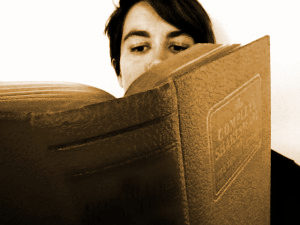Today’s post is on the work of Prison Performing Arts, which was featured in this month’s Spare Change Spotlight. Meg Sempreora gives us a small glimpse of the wisdom she has shared and found during her work with incarcerated people at Prison Performing Arts. Meg is also an associate professor and the director of literature emphasis at Webster University.
My first prison class was in a small, warm room. Thirty-one men had given up Monday Night Football to sit in little plastic chairs, each balancing a book and a pad on his lap. They looked a bit like visiting parents in a classroom of small chairs. The men fully ringed the room, backing up against the chalkboard.
I almost missed this experience, this most rewarding of teaching. I almost said “no” to the men and women so hungry for this opportunity, citizens who will one day be out in the world with us. I initially thought that my privileged background disqualified me as a source of knowledge for these students. But because I said “yes” I have experienced—at three Missouri prisons—some of the most rewarding teaching of my life. As part of Prison Performing Arts, a non-profit organization created by one amazing woman, Agnes Wilcox I began teaching in 2000 with Act 2 of Hamlet, and have now worked on Macbeth, Julius Caesar, Oedipus Rex, Oedipus at Colonus, Twelfth Night, A Midsummer Night’s Dream, The Tempest,Gogol’s The Inspector General, and Mary Zimmerman’s contemporary interpretation of Ovid’s The Metamorphoses. As this particular team of actors was not only untrained in acting, but also almost entirely unfamiliar with Shakespeare, a few volunteer professors from St. Louis universities provided seminars throughout the semester on the world of the Renaissance and Shakespeare in particular, on acting and speech, and especially on reading the language of the play. One or two acts of a play is studied for a full semester, bringing the men deeper and deeper into an understanding, not only of the language, characters, and themes of the drama, but also of themselves.
The scholarly seminars are followed by casting and an intense rehearsal period with Agnes, a professional theater director: each line is examined; speeches are memorized; and men practice in the yard and in their cells; Agnes gathers costumes from willing donors or second-hand stores; and finally three performances crown the semester’s work. Fellow inmates attend on the first two evenings, then family, friends, and supporters of Prison Performing Arts from St. Louis.
My self-doubts were answered that first evening; the men taught me so much with their earnest hunger, courtesy, and dauntless willingness to repeat countless times, “What does that mean?” What I learned that first night and have confirmed after thirteen years of teaching dramatic literature in Missouri prisons is that I need to ask difficult, interesting questions—the same ones that I ask my undergrads; I need to listen hard when my incarcerated students answer, because they will offer answers that I have not heard before. Their answers come from a deeper place, or a more remote place, or a hungrier place.
If you love me, hold not off.
Every class is filled with moments of discovery, of drama. During that first class, the students were reading one sentence each around the circle in order to hear Shakespeare’s language, ask questions, learn vocabulary, and pull everybody into the enterprise of making meaning. Many of the men are not readers, and this story is about one such student. I shall call him Tom. It was Act 2.2, and Hamlet, not sure whom he can trust, is urging his old friends Rosencrantz and Guildenstern to level with him and tell him if they really came on their own to visit him, or, if they were sent for by King Claudius to spy on him. (We know that R & G were brought there to be spies. We watch Hamlet deeply hurt, discovering his friends’ betrayal.)
We moved around the circle slowly reading the scene—Hamlet keeps probing; R &G keep evading his questions. When Tom’s turn came, an urgent line of Hamlet’s fell to him. Hamlet pleads with his old friends to level with him.
Tom looked hard at his book and read his line silently, then looked up and, speaking directly to the next man in the circle, who turned to face him—as if they were alone reading the scene—Tom said, simply, deeply, “If you love me, hold not off.” The men were silent for a moment. They had heard not just the words, but also the meaning: Hamlet is a man asking for the truth from his friends; he is invoking their love for him as a righteous means to that truth. Hamlet’s unguarded, honest moment became Tom’s own unguarded moment. As a brave, engaged reader, he risked saying “If you love me” without a smirk, without an embarrassed chuckle, and, because of his effort, the class took a leap. They all understand conning, betrayal, and the need for true friends. The nature of Rosencrantz and Guildenster ’s possible turning point—from paid deception back to friendship— was made clear to the men in the room by Tom’s authentic line reading. The stakes for these false friends were high: Rosencrantz and Guildenstern do “hold off”; they continue on their course of deception and ultimately they perish.
I am grateful that I said “yes” to this experience. “If you love me, hold not off” my students say to me with their desire to learn and, as adequately as I can, I have answered.


